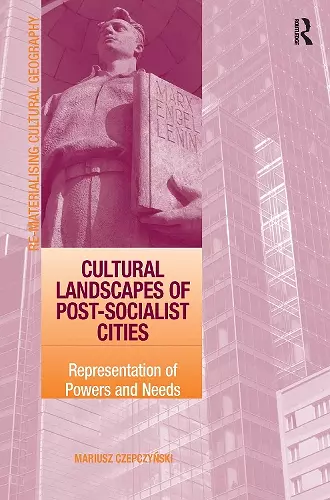Cultural Landscapes of Post-Socialist Cities
Representation of Powers and Needs
Format:Paperback
Publisher:Taylor & Francis Ltd
Published:11th Nov '16
Currently unavailable, and unfortunately no date known when it will be back
This paperback is available in another edition too:
- Hardback£150.00(9780754670223)

The cultural landscapes of Central European cities reflect over half a century of socialism and are marked by the Marxists' vision of a utopian landscape. Architecture, urban planning and the visual arts were considered to be powerful means of expressing the 'people's power'. However, since the velvet revolutions of 1989, this urban scenery has been radically transformed by new forces and trends, infused by the free market, democracy and liberalization. This has led to 'landscape cleansing' and 'recycling', as these former communist nations used new architectural, functional and social forms to transform their urbanscapes, their meanings and uses. Comparing case studies from different post-socialist cities, this book examines the culturally conditional variations between local powers and structures despite the similarities in the general processes and systems. It considers the contemporary cultural landscapes of these post-socialist cities as a dynamic fusion of the old communist forms and new free-market meanings, features and democratic practices, of global influences and local icons. The book assesses whether these urbanscapes clearly reflect the social, cultural and political conditions and aspirations of these transitional countries and so a critical analysis of them provides important insights.
'Post 1989 societal changes have impacted palpably on East European urban structures. Cultural Landscapes of Post-Socialist Cities offers a vivid account of these changes. With its carefully crafted blend of general overview and specific case example, it highlights tensions between "insider" and "outsider" perspectives, between past, present and future, the book could be both pedagogically effective and conceptually evocative.' Anne Buttimer, University College Dublin, Eire 'Czepczynski’s book makes a welcome appearance among a steady, yet rather sparse, flow of publications dedicated to the topic of post-socialist urban transformation. While others tend to be edited collections of articles by different authors, his work stands out as one that develops theoretical ideas on the subject more in-depth... The book is a welcome and recommended read.' H-Soz-u-Kult 'With this new book, Marius Czepczynski offers interested readers a sophisticated account of the transformations experienced in urban environments across central, east, and southeast Europe. With conceptual richness and clarity, Czepczynski skillfully integrates both theoretical and empirical material and guards against exaggeration, simplification, or stereotyping... I highly recommend it.' Slavic Review '... the book is a welcome contribution to the scholarship on postsocialist Central Europe, as well as to current research on transitional cities, which has somehow been dominated by writings on Chinese cities.' City & Community 'Czepczynski's thought-provoking book on post-socialist cityscapes makes for timely reading, 20 years after the fall of the Berlin Wall, which has become emblematic of the transformation of the Central European bloc. The demolition of the Wall was both a material and symbolic act and this is a book on material and symbolic practices and representations of power in the urban landscape... it will certainly be of interest to postgraduate students and scholars of cultural geography,
ISBN: 9781138254275
Dimensions: unknown
Weight: 453g
224 pages